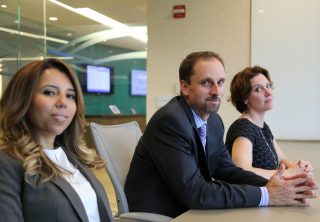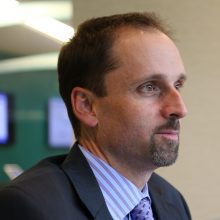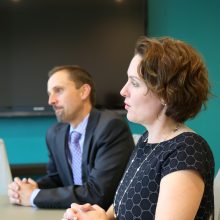
On Sept. 4, the finalists for this year’s Greater Washington Government Contractor Awards were announced and WashingtonExec is bringing you its annual series with the nominees.
The winners will be unveiled on Nov. 13 at The Ritz Carlton in Tysons Corner by the Fairfax County Chamber of Commerce and the Professional Services Council. With more than 1,000 business and public sector leaders attending the event, our series will keep you up-to-date about all the finalists for this year — who they are, what they do and why they are worthy of winning.
Our next interview is with Agilex Technologies Inc.‘s Melissa Adamson, Vice President for advanced technologies; Brad Cole, Vice President of business development within the company’s Justice & Homeland Security sector business; and Hildi Pineda, Vice President managing the U.S. Department of Veterans Affairs account. The company is a finalist in the “Contractor of the Year” $75 million to $300 million category.
WashingtonExec: How would you describe your business strategy during the past 3-5 years, and what is your organization’s plan for growth during the next 3-5 years?

Brad Cole: Since our founding, and especially during the past 3-5 years, we have stayed focused on our core customer base and our core competencies. This has allowed us to develop the skill sets needed to solve real problems for the government.
This leads to one of our corporate mantras — that we’re solving problems, not just working them forever. Initially, these projects were more narrowly defined, but as we’ve proven ourselves repeatedly, we’re being asked to lead larger and larger programs.
Melissa Adamson: Agilex is mission-focused. This allows us to demonstrate real value in terms of what we accomplished.
Hildi Pineda: We are also committed to continuous innovation. We’re constantly looking for better or more efficient ways to do things for the government. And we’re often first-to-market in terms of introducing new technologies to our clients, helping them capitalize on real breakthroughs in technology.
What’s helped us is that we’re risk takers on the technology and innovation side. From our perspective, that’s paid off. Since we’re willing to pursue new approaches, we’ve been able to attract great employees, as they’re able to work on exciting, challenging projects.
WashingtonExec: How has your business been able to grow as the federal market contracts?
Melissa Adamson: Our track record for delivery is a key driver of our success. We’re very focused on our existing clients and committed to providing rapid results. As a result, we’ve been able to quickly grow our client relationships.
Brad Cole: We also focus on high-value services. While the government has diverse needs, the more generic areas are often the first to be cut. Furthermore, we made a deliberate and early decision to focus on critical markets like healthcare and national and homeland security. They have proven to be very durable. Coupled with our performance, this has allowed us to become more valuable and strategic to our clients.
Hildi Pineda: The government is trying to do more with less. This drives our need to innovate in terms of delivery – how can we gain additional efficiencies? With Agilex, our customers feel like they’re getting the most bang for their buck. Because we deliver, because these are cutting-edge approaches, because these are high-impact areas, we provide maximum value.
WashingtonExec: What is the fastest growing component of your business?

Melissa Adamson: From a technology perspective, mobile has been a huge pillar for us. It has been incredible to see how fast government has moved to embrace it. We were very early adopters of commercial mobile technologies and one of the first integrators to build apps for government on these platforms. As a result, we were heavily involved in breaking down the barriers like security. Between our subject matter expertise and the tremendous pressure on the federal marketplace to adopt these technologies, this has become a very accelerated component of our business. We’re seeing a similar situation today with both cloud and Big Data technologies.
Brad Cole: What’s been most remarkable is the fact that we’re firing on all cylinders across the company. For example, I’m pretty proud of what we’ve been able to accomplish in the Justice & Homeland Security sector. However, I’m constantly amazed by what I see happening in the other sectors. Not surprisingly, we’re a pretty motivated group, but this in-house competition helps to take it to another level.
WashingtonExec: What was your organization’s largest accomplishment in the last 12-18 months?
Brad Cole: We’re quite proud of the turnaround that we’ve been able to execute for a number of high profile government programs that have lagged historically. For example, we are working on a program that had floundered for one reason or another for over a decade. During the past 18 months, we’ve led multiple successful releases, which have helped restore credibility for this program. Beyond the immediate impact, the methodologies and practices that we’re implementing are setting them up for sustainable success.
Hildi Pineda: In terms of healthcare, we’ve had a significant impact with VA. We’re helping to move their mission forward, improve care delivery and enhance access. We’ve done this through mobility and our work in evolving VistA into an enterprise health management platform.
Melissa Adamson: We are delivering on very large and complex programs that address strategic mission needs. This is how we’ve been able to stay ahead of the market and grow so fast.
WashingtonExec: Given the current state of the federal contracting market, how has your organization’s marketing approach to customers, employees and future customers changed?

Hildi Pineda: One of the ways that we’ve been able to differentiate ourselves is by being first-to-market with new innovations. In our accounts, we were first with agile, DevOps, continuous integration, automated deployments and so on. Today, we’re helping clients define and implement rapid application development platforms. Our overriding focus is on helping them capitalize on innovation and implement new efficiencies across their organization.
What’s helped us is that we’re risk takers on the technology and innovation side. From our perspective, that’s paid off. Since we’re willing to pursue new approaches, we’ve been able to attract great employees, as they’re able to work on exciting, challenging projects.
Melissa Adamson: One thing that hasn’t changed is that we continue to focus on the four technology pillars of the company: agile, analytics, cloud and mobile. As we’ve grown, more customers have come to recognize our leadership in these areas.
What has changed is that we’re no longer just evangelists. Instead we are pointing to results that we’ve produced in similar agencies using these same approaches. This keeps us at the forefront of the market and opens new doors for us.
Brad Cole: Five years ago, it was about educating customers to the realm of what’s possible. Today, we’re showing them what’s been achieved with those same methodologies, technologies and innovations. It was somewhat theoretical when we started. Today, it is absolutely real.
WashingtonExec: What are the largest challenges that you predict your business will face in the next 5 years?
Brad Cole: No. 1 is maintaining our agile culture as we continue to grow to become a larger company. Part of our strategy has always been to maintain the agility of a small company. This takes work every day. Empowering and supporting our employees is critical. We also need to ensure that our resources remain aligned with our clients’ needs and are readily accessible to them. Fortunately, these are challenges that we have long recognized and taken proactive steps to address.
Hildi Pineda: Scaling our operations to support our growth will be critical. We need to ensure that we’re not jeopardizing our reputation to take on new opportunities. New processes may be needed to maintain consistency, but they can’t constrain our innovation or agility.
Scaling is especially important in terms of our talent. As we bring new people on board, we need to train, develop and mentor them to fulfill these roles.
Melissa Adamson: In a similar vein, our culture must evolve to accommodate an influx of millennials into the workforce. This year, we expanded our college recruiting program significantly, and we’re seeing a lot of new energy throughout the company. Our ability to fully integrate these new hires into our workforce will have a real impact on our performance going forward.
Brad Cole: Another challenge is keeping ahead of the market. Our competitors are very aware of our success and are looking to replicate many of our approaches. For government, the fact that we’ve raised the bar this way is a good thing. However, we need to challenge ourselves to up the ante if we want to remain at the forefront of technology innovation.
WashingtonExec: How does your organization maintain engagement with all levels of employees?
Melissa Adamson: With our growth, we’ve had to enhance our commitment to communications. We’ve also learned that it isn’t one-size-fits-all. Rather, we’re using a variety of tools – Yammer, weekly newsletters, webcasts, communities of interest, Wikis – to engage employees. What’s probably been most effective is giving them forums, like our annual employee town hall, where they can lead the discussion about where the company needs to go next.
WashingtonExec: How is your business involved in the community?
Brad Cole: At the corporate-level, we support a variety of causes, such as the Wounded Warrior program and the National Children’s Center. Increasingly, we’re supporting our employees in helping specific causes, such as feeding the hungry or the mentorship work that the Agilex Women’s Group leads. During the past two summers, a number of our employees have gotten together to teach computer programming to high school students with the hope of encouraging them to pursue STEM educations.
WashingtonExec: What would your clients say about your company?
Melissa Adamson: They would say that we deliver. That we give them results. That we focus on some of their most difficult problems and solve them. We sometimes transform how they do business. At VA, for example, we’re helping them redefine how they provide care, as they shift to a more patient-centric delivery model.
Hildi Pineda: Our clients would say that we’re laser-focused on their mission, quality and results. They might add that we’re able to show them a path to their objective and then we get them there.
WashingtonExec: How do you see technology evolving during the next 3-5 years?
Melissa Adamson: It will become less device-centric and more about the mobility of information. Expectations for how, when and where we will consume information will change dramatically. At any given point, people will expect to access information via a variety of devices – glasses, watches, even a washing machine.
Brad Cole: The idea that everything is custom designed and built for government won’t last. This is clear for mobility, but it is also true for areas like open source and the cloud. What we’ve seen over the past year is that no aspect of government can afford to ignore their significant potential. As a result, the line between government and commercial technology has gotten a lot thinner, and I think will continue to disappear over the coming years.
WashingtonExec: Agilex was named the 2011 Government Contractor of the Year in the $25 million to $75 million category. How has the company changed since then?
Brad Cole: What’s been important is our continuity at the top and how we’ve cultivated the next generation of leaders at Agilex. Obviously, our growth in terms of revenue and employees has been staggering. However, what’s been most amazing is the growth of our people. You’re able to watch someone that you hired several years ago take on your role or another leadership position – it’s very rewarding to see. This growth we’re experiencing really encourages every employee to take on new challenges, which is very motivating.


